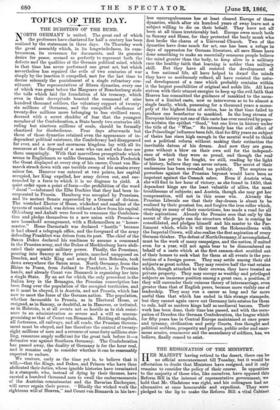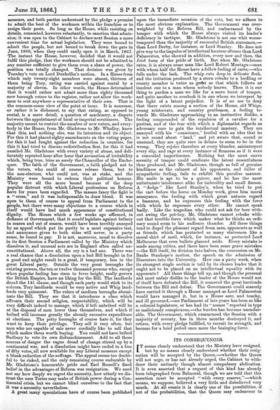THE RESIGNATION OF THE MINISTRY.
HER MAJESTY having retired to the desert, there can be no official announcement till Tuesday, but it would be affectation to doubt that Ministers have resigned, and it only remains to consider the policy of their course. In opposition to the majority of those who, like ourselves, have opposed this Reform Bill in the interest of representative government, we hold that Mr. Gladstone was right, and his colleagues had no alternative at once honourable and expedient. They were pledged to the lip to make the Reform Bill a vital Cabinet measure, and both parties understood by the pledge a promise to admit the beat of the workmen within the franchise or to resign their posts. So long as the House, while resisting on details, consented, however reluctantly, to sanction that admis- sion; it was open to the Cabinet to declare next Session a more convenient time for actual legislation. They were bound to admit the people, but not bound to break down the gate in June, 1866, when they could easily open it in March, 1867. The instant the House, however, decided that it would not fulfil this pledge, that the workmen should not be admitted in .any number sufficient to give them even a share of power, the position was totally changed. That decision was givezi by Tuesday's vote on Lord Dankellin's motion. In a House from which only twenty-eight members were absent, thirteen of them being Tory, rating was carried against rental by a majority of eleven. In other words, the House determined that it would rather not admit more than eighty thousand slew borough voters to the register, rather not allow the work- men to seat anywhere a representative of their own. That is the common-sense view of the point at issue. It is nonsense, or rather it is dishonest, to say that rating, as opposed to rental, is a mere detail, a question of machinery, a dispute between the appointment of local or imperial scrutineers. The majority meant to restrict the number of new voters, and every- body in the House, from Mr. Gladstone to Mr. Whalley, knew that this, and nothing else, was its intention and its object. For this it had placed eighty amendments on the voting paper, for this it had fought against the reduction in counties, for this it had tried to discuss redistribution first, for this it had assailed Mr. Gladstone with every variety of abuse, and deli- berately repeated hour after hour that accusation of irritability which, being true, tries so sorely the Chancellor of the Exche- quer. The faith of the Government, a faith pledged not to the voters, who could of course release them, but to the non-electors, who could not, was at stake, and the Jitmistry were bound to redeem their political honour. They were all the more bound because of the deep popular distrust with which Liberal professions on Reform have for years been regarded. The masses fancy the fight is a "cross," and it was indispensable to draw blood. It was open to them of course to appeal from Parliament to the people, but there were many objections to a course which in itself would have had much appearance of constitutional dignity. The House which a few weeks ago affirmed, in defiance of Government, that it would legislate against bribery in season and out of season, would have been terribly annoyed by an appeal which put its purity to a most expensive test, and annoyance given to both sides will never, in a party sense, be found to pay. It is not, moreover, usual to dissolve in its first Session a Parliament called by the Ministry Which dissolves it, and unusual acts are in England often called un- constitutional. Above all, the cry is a bad one. There was a real chance that a dissolution upon a bad Bill brought in for a good end might result in a great, if temporary, loss to the great Liberal party. Outside the very great boroughs the existing powers, the ten or twelve thousand persons who, except when popular feeling has risen to fever height, really govern the British Empire, have no liking for the Bill. The landlords dread the 14/. clause, and though each party would stick to its colours, Tory landlords would be very active and Whig land- lords very quiescent. The rulers of medium boroughs abomi- nate the Bill. They see that it introduces a class which affronts their second religion, respectability, which will be very difficult indeed to manage, which if left unbribed will be at the disposal of men lower than themselves, and which if bribed will increase greatly the already excessive expenditure at elections. The petty boroughs of course hate it, for they want to keep their privilege. They sell it very often, but men who are capable of sale never cordially like to sell that which makes them worth buying. You could not have bribed Sudbury to vote its own disfranchisement. Add to all these sources of danger the vague dread of change stirred up by a continental war, and a dissolution might have ended in a loss of fifty votes, all now available for any Liberal measure except a blank reduction of the suffrage. The appeal seems too doubt- ful to be risked, and the only remaining course endurable by Mr. Gladstone's honourable pride and Earl Russell's fixed belief in the advantages of Reform was resignation. We need not say how deeply we regret the necessity, how utterly we dis- trust the uses Tories may make of British power during a Con- tinental crisis, but we cannot blind ourselves to the fact that it was a necessity nevertheless. A great many speculations have of coarse been published upon the immediate occasion of the vote, but we adhere to the most obvious explanation. The Government was over- weighted by the Reform Bill, and embarrassed by the temper with which the House always visited its leader's deficiency in tactique. Mx. Gladstone is not one whit worse- tempered than the majority of successful British statesmen,— than Lord Derby, for instance, or Lord Stanley. He does not give way to the impulse of intellectual hauteur oftener than Lord Palmerston, who showed in addition, every now and then, the Irish form of the pride of birth. But when Mr. Gladstone rates, it is always some man like Lord Robert Montagu—man with whom half the House have a fellow feeling of caste,—who falls under the lash. The whip cuts deep in delicate flesh, and the irritation produced by a stern rebuke to a lordling or county member is twice as grelat as that which follows an insolent one to a man whom nobody knows. Then it is one thing to pardon a man we like for a mere burst of temper, and quite another to overlook it in one whom we interpret by the light of a latent prejudice. It is of no use to deny that there exists among a section of the House, old Whigs, young aristocrats, and country gentlemen, a feeling to- wards Mr. Gladstone approaching to an instinctive dislike, a feeling compounded of the repulsion of a cavalier for a puritan, and of the fear with which a diplomatist regards an adversary sure to gain the intellectual mastery. They are annoyed with his "conscience," fretful with an idea that he is not sound about "land," and yet aware that, sound or unsound, they are quite sure in debate to seem to be in the wrong. They rejoice therefore at every blander, misinterpret every slip, and rage at every instance of firmness as if it were a concealed impertinence. Nothing but the most suave serenity. of temper could eradicate the latent resentfulness thus produced, and Mr. Gladstone, though as full of genuine kindliness as the calmest of his opponents, and fuller of sympathetic feeling, fails to exhibit this peculiar manner. His smile is apt to be a quiver, and he has the most unfortunate intolerance alike for imbecility and small finesse. A " dodge " like Lord Stanley's, when he tried to put the cart before the horse on Monday week, gives him moral annoyance, the feeling with which great natures regard a baseness, and he expresses this feeling with the force with which he expresses every other. He cannot speak badly. Like the tragedian who could not ask for beer with- out awing the pot-boy, Mr. Gladstone cannot rebuke with- out that terrible force which makes what he thinks an ordi- nary sound seem to his audience thunder. All these things tend to dispel the pleasant regard from men, opponents as well as friends, which has protected so many statesmen like a moral shirt of mail, which, for instance, so protected Lord Melbourne that even bullets glanced aside. Every mistake is made among critics, and there have been some grave mistakes —the Bill itself, its division into halves, the concession on Mr. Banks Stanhope's motion, the speech on the admission of Dissenters into the University. How can a party work, when its strongest single section is told by its chosen leader that it ought not to be placed on an intellectual equality with its opponents ? All these things tell up, and though the personal and most unfair dislike to the leader of the House would not of itself have defeated the Bill, it removed the great barricade between the Bill and defeat. The Government could scarcely have carried it through a House managed as Lord Palmerston would have managed it, but in a House sore, and touchy, and ill governed,—no Parliament of late years has been so like a colonial legislature, or has had its" scenes "reported in type so maliciously conspicuous,—the burden has become unendur- able. The Government, which commenced the Session with a majority of seventy, has in three months destroyed it, and retiree, with every pledge fulfilled, to recruit its strength, and become for a brief period once more the besieging force.































 Previous page
Previous page